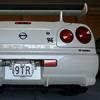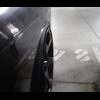Hi Flowing Shop Options
Announcements
-
Similar Content
-
Latest Posts
-
By Murray_Calavera · Posted
Yeah in that case, pulling the dent out. Event a very slight dent can create a lot of work filler-wise and there is a strong chance the panel won't be the factory shape when you are done (as the dent will result in a new high point created somewhere, then everything is brought up to that new high point... but the panel shouldn't be that high if that makes sense). So you've filled and primed the panel and it is flat, why would you go back and remove the primer and add more filler? -
Something else I have been faffing with while the car was off the road is making the AC work. Assuming the car isn't at a thermal limit the idea of having AC while waiting in line to go on track sounds delightful. I have actually been lugging around the weight of the entire system since 2018 when the RB25NEO went in without it working at all. The main reason was in the first few events before I got around to re-gassing it the rubber hose that runs under the manifold had the factory heat wrap/sleeve fail resulting in this: ~2 years ago I purchased a complete used R32 AC line set but when I finally went to install it the line i needed was different where the expansion section is I found a local place that was able to replace the rubber section and re-crimp. They also added some modern heat sleeve to the hose Tight fit but fingers crossed this is the last physical piece of the puzzle needed
-
the top black section is bonded to the silver section with some form of rubber. I assume to isolated NVH from the box
-
Plan B? Get someone to machine up a metal bush/collar/whatever it needs to be to replace the rubber? I haven't had a close look at that part recently to have a proper feel for whether that's possible. But it might be easy.
-
I do not want to install a short shifter and the only other stock throw shifter I have seen is the Nismo "Rigid shifter" for $290 So plan A is to fill it with sikaflex to stiffen it up and hope for the best
-






Recommended Posts
Create an account or sign in to comment
You need to be a member in order to leave a comment
Create an account
Sign up for a new account in our community. It's easy!
Register a new accountSign in
Already have an account? Sign in here.
Sign In Now